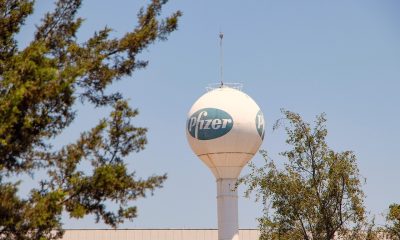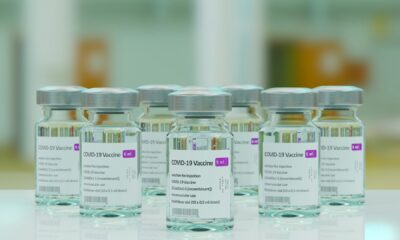Biotech
COVID-19 vaccine developers increased their cash flow by 15.2% in 2020
Johnson&Johnson, AstraZeneca, Moderna and Pfizer raised their cash in 2020, amounting to a total of $ 28.85 billion. For its part, AstraZeneca increased its cash flow by 45.9% in 2020, to $7.83 billion, compared to $5.37 billion a year earlier. Despite the uncertainty surrounding the British drugmaker’s vaccine, the group capitalized on the pandemic with upbeat financial results.

The biotech companies that have developed the COVID-19 vaccines have significantly increased their cash flow in 2020. Johnson&Johnson, AstraZeneca, Moderna, and Pfizer have leveraged their benchmark position in the race for the coronavirus vaccine and posted a 15.2% higher cash on hand at the end of 2020 compared with 2019.
The combined cash of Johnson&Johnson, AstraZeneca, Moderna, and Pfizer rose to $28.851 billion in 2020, up from $25.055 billion recorded in 2019. All the pharma companies that have the Covid-19 vaccine approved in the European Union increased their cash with the exception of Johnson&Johnson.
If you want to read more details about the cash flow increase of the biotech companies that have developed the COVID-19 vaccine, download our companion app. The Born2Invest mobile app is available for free and keeps its readers up to date with the latest financial business in the world.
Despite being the youngest company, Moderna also demonstrated record growth in this respect
The U.S. biotech quadrupled its cash in the pandemic year, from $1.26 billion in 2019 to $5.25 billion in 2020. Moderna, founded in 2010, developed a vaccine against Covid-19 with efficacy of more than 94%. The company has more than 800 employees and posted total revenues of $779.4 million in 2020 versus $58.2 million in 2019, a more than tenfold increase in its 12-month result. The pharmaceutical company with the largest cash on hand is Johnson&Johnson.
The U.S. multinational, a manufacturer of medical devices and pharmaceuticals, experienced a 19.2% decline in its cash in 2020, to $13.985 billion, compared with $17.30 billion in 2019. The group, owned by Belgian drugmaker Janssen, was the latest to receive approval for its Covid-19 vaccine from the European Medicines Agency (EMA). The regulatory agency gave the product the green light in the second week of March.
Johnson&Johnson is the biotech company with the largest cash flow, with $13.98 billion
The European Commission (EC) has a supply agreement with the pharmaceutical company for up to 400 million doses. Spain’s Minister of Health, Carolina Darias, recently announced that the country will receive 5.5 million doses of the Janssen vaccine in the second quarter. At the moment it is the only one approved from a single administration.
For its part, AstraZeneca increased its cash flow by 45.9% in 2020, to $7.83 billion, compared to $5.37 billion a year earlier. Despite the uncertainty surrounding the British drugmaker’s vaccine, the group capitalized on the pandemic with upbeat financial results. AstraZeneca closed 2020 with revenue of $35.741 billion compared with $32.32 billion in 2019. In addition, over the past week the drugmaker has received two pieces of good news from the EMA. First, the regulatory agency reaffirmed the safety and efficacy of its vaccine and endorsed its use, before doubts about the possibility of it causing cases of thromboembolism, and the EMA certified one of its plants in the Netherlands.
Pfizer increased its cash by 59.1% in 2020, to $1.78 billion
Finally, Pfizer increased its cash by 59.1% at the end of 2020 to $1.78 billion, compared with $1.12 billion a year earlier. The U.S. pharmaceutical company is the one with the lowest cash flow, although it is the largest in terms of turnover. The company, which together with BioNTech developed the first vaccine approved in the EU, increased its turnover to more than $40 billion. The most widespread vaccine in the EU so far was approved at the end of 2020.
The pharmaceutical consortium and the EC have been expanding their commitments to increase the supply of doses. In addition, Pfizer is optimistic for the current fiscal year and expects to earn $15 billion for its vaccine in 2021.
__
(Featured image by geralt via Pixabay)
DISCLAIMER: This article was written by a third party contributor and does not reflect the opinion of Born2Invest, its management, staff or its associates. Please review our disclaimer for more information.
This article may include forward-looking statements. These forward-looking statements generally are identified by the words “believe,” “project,” “estimate,” “become,” “plan,” “will,” and similar expressions. These forward-looking statements involve known and unknown risks as well as uncertainties, including those discussed in the following cautionary statements and elsewhere in this article and on this site. Although the Company may believe that its expectations are based on reasonable assumptions, the actual results that the Company may achieve may differ materially from any forward-looking statements, which reflect the opinions of the management of the Company only as of the date hereof. Additionally, please make sure to read these important disclosures.
First published in PlantaDoce, a third-party contributor translated and adapted the article from the original. In case of discrepancy, the original will prevail.
Although we made reasonable efforts to provide accurate translations, some parts may be incorrect. Born2Invest assumes no responsibility for errors, omissions or ambiguities in the translations provided on this website. Any person or entity relying on translated content does so at their own risk. Born2Invest is not responsible for losses caused by such reliance on the accuracy or reliability of translated information. If you wish to report an error or inaccuracy in the translation, we encourage you to contact us.

-

 Fintech1 week ago
Fintech1 week agoRuvo Raises $4.6M to Power Crypto-Pix Remittances Between Brazil and the U.S.
-

 Biotech7 days ago
Biotech7 days agoEurope’s Biopharma at a Crossroads: Urgent Reforms Needed to Restore Global Competitiveness
-

 Crowdfunding2 weeks ago
Crowdfunding2 weeks agoAWOL Vision’s Aetherion Projectors Raise Millions on Kickstarter
-

 Africa3 days ago
Africa3 days agoFrance and Morocco Sign Agreements to Boost Business Mobility and Investment

























